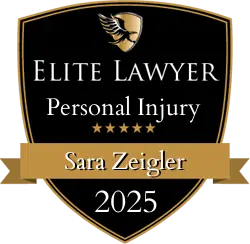Many different types of accidents occur in West Virginia. Car crashes, slip and falls, and medical malpractice are just a few of these.
When accident victims suffer serious injuries, they can file a personal injury claim to recover their losses, such as medical expenses, lost income, and more.
When filing a personal injury claim, victims must prove that someone else was to blame for their injuries. Additionally, victims may have contributed to the accident and the resulting injuries, causing them to wonder if they are entitled to any compensation. Below, one of our West Virginia personal injury lawyers explains further.
Elements of Negligence in Personal Injury Law
When filing a personal injury claim, there are four elements of negligence that victims must prove to obtain full compensation. These are as follows:
- Duty of care: The first element to prove is that the defendant owed the plaintiff a duty of care. This is sometimes a relatively straightforward element to prove, while other times it is one of the most difficult aspects of the case.
- Breach of duty: Proving the defendant breached their duty is sometimes more challenging. This is essentially proving the act of negligence that caused the accident and resulted in injuries by demonstrating the action or inaction of the defendant that caused harm to the claimant.
- Causation: An act of negligence alone is not enough to file a personal injury claim. Accident victims must also show the direct link between the act of negligence and how it caused the accident.
- Damages: The purpose of personal injury claims is to compensate accident victims for the losses they suffered due to another person’s negligence. If there are no damages to compensate for, there is no personal injury claim. In addition to economic damages like medical expenses and wage loss, a claimant is also entitled to prove and recover for non-economic damages such as pain.
Understanding Comparative Negligence in Personal Injury Claims
The law recognizes that sometimes, accident victims contribute to the accident that caused their injuries. When accident victims are partly to blame for an accident, the law also recognizes that they may not deserve full compensation for all of their losses. This is known as the comparative negligence law.
Some states follow the pure comparative negligence law. Under this law, if an accident victim is even one percent at fault for an accident, they are barred from receiving any compensation at all. West Virginia follows a comparative negligence model, which is more relaxed than pure comparative negligence.
In West Virginia, accident victims can claim compensation as long as they are 50 percent or less at fault for an accident. If an accident victim is more than 50 percent at fault for an accident, they do not have the right to any compensation at all. However, when accident victims are partly at fault for their injuries, the amount of compensation they are entitled to is reduced by their same percentage of fault.
For example, you may have been involved in a car accident. Another motorist may have run a red light and crashed into you in an intersection. However, you were also distracted at the time and so, you did not see the car quickly approaching. In this instance, you may be assigned 10 percent of the blame while the other driver is assigned 90 percent of the blame. If you were awarded $100,000 for your injuries and other losses, you would receive $90,000 because your damages would be reduced by the same 10 percent of fault you carried.
The Importance of Determining Liability
Determining who is liable, or at fault, for an accident is of critical importance. It directly impacts who receives financial compensation and the amount of damages accident victims are entitled to.
Due to the comparative fault law in West Virginia, though, defendants often argue that the accident victim was partly to blame for their injuries. They raise this argument to shield themselves from paying full damages.
It is important to work with a West Virginia personal injury lawyer who can refute these claims of partial fault. If the defendant is successful with their claims, it can greatly reduce the compensation you ultimately receive. While very few personal injury cases go to court, the comparative fault law is still followed during negotiations. An adjuster for the insurance company will investigate to determine what happened and who was at fault. You should also have a lawyer on your side who will conduct their investigation and work with experts to determine liability.
When Should You Contact a West Virginia Personal Injury Lawyer?
After an accident, it is generally recommended that you contact a West Virginia personal injury lawyer. Having legal representation becomes particularly important in certain situations. These include:
- You have suffered serious injuries in an accident, or have lost a loved one.
- Your injuries are permanent or will require long-term rehabilitation.
- The insurance company is offering a settlement that is not enough to fully cover your injuries and other losses, or you are unsure of the total damages you will incur due to the accident.
- You missed work due to the accident, or you must return to work in a reduced capacity and therefore, receive lower wages.
- The individual liable for your injuries does not have adequate insurance.
- The liable party is arguing that you contributed to, or caused, the accident.
A West Virginia personal injury lawyer will know how to overcome the challenges faced in these cases so you obtain the full damages you are entitled to.
Our Personal Injury Lawyer in West Virginia Provides Sound Legal Advice
Negligence is the foundation of all personal injury cases in West Virginia, but it is never easy to prove. At Kaufman & McPherson, our West Virginia personal injury lawyer will investigate to determine how the accident occurred and who is to blame so they can be held accountable for paying the full damages you justly deserve. Contact us to schedule a free review of your case and to get the legal help you need.








